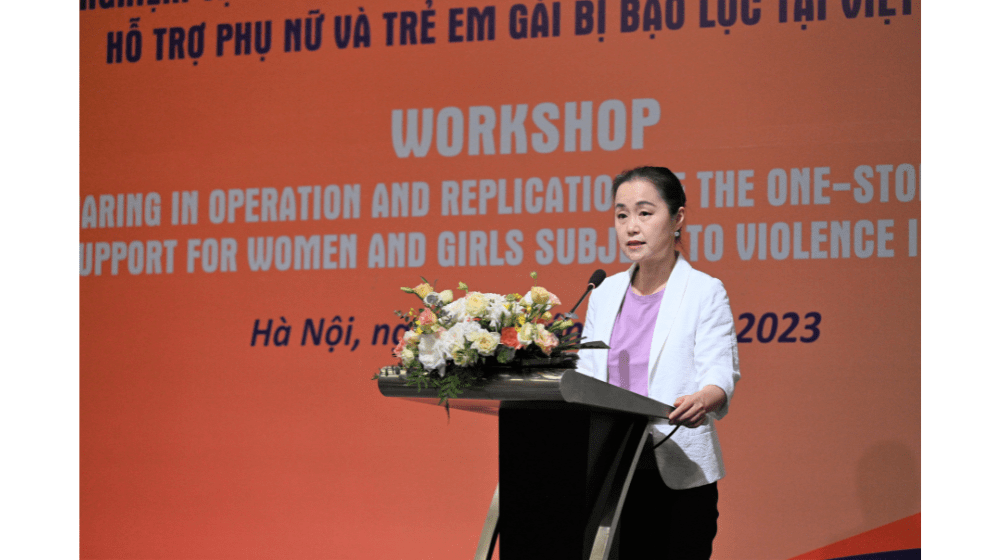- Excellency Vice Minister of Labour, Invalids and Social Affairs, Madam Nguyen Thi Ha;
- Mr. Cho Han-Deog, Country Director of KOICA;
- Representatives from the Ministry of Health, Ministry of Justice, Ministry of Public Security and Ministry of Culture, Sports and Tourism;
- Representatives from local authorities of Hanoi, Quang Ninh, Thanh Hoa, Danang, Khanh Hoa and HCM City;
- Representatives from Vietnam Farmers’ Union and CSAGA;
- Local media.
On behalf of UNFPA Vietnam, I would like to welcome you all to today’s workshop to share experience in operating the one stop service centre model, which is also known in Viet Nam as Anh Duong House and to discuss mechanisms to replicate and sustain it nationwide.
I would like to express my sincere appreciation to Excellency Vice Minister Nguyen Thi Ha for co-chairing the workshop. Her presence confirms the commitment of the Government of Vietnam to addressing gender-based violence in Vietnam.
Also, I would also like to express my sincere thanks to KOICA for partnering with UNFPA in ending gender-based violence in Vietnam through the Project “Building a Model to Respond to Violence against Women and Girls in the period 2017-2021 in Viet Nam” which is then followed by the Bridge Phase Project “The Follow-up Activities of Building a Model to Respond to Violence against Women and Girls in Viet Nam, July 2022-June 2023”.
Dear participants,
The first ever One Stop Service Center opened in Quang Ninh in April 2020 by the Quang Ninh Social Work Centre of the Ministry of Labour, Invalid and Social Affairs with technical and financial support from UNFPA in partnership with the Korea International Cooperation Agency (KOICA).
In January 2022, the Ministry of Labour, Invalid and Social Affairs opened another Anh Duong House at the Social Work Centre in Thanh Hoa province with financial support from the Government of Japan. Six months later, in an effort to diversity the working modality of Anh Duong House in order to reach out more GBV survivors, UNFPA contracted CSAGA to establish a One Stop Service Centre (OSSC) in Ho Chi Minh City and Da Nang City. All three Anh Duong Houses have been operated with financial support from the Government of Japan and then the Government of Australia since June 2022.
Anh Duong House aims at detecting, preventing and supporting survivors of violence. The Anh Duong House provides essential, comprehensive, and integrated services to women and girls who are experiencing and/or at risk of gender-based and domestic violence. It provides a wide range of services, meeting international standards, including health care, psychological support, counselling, social welfare services, emergency shelters, police protection, legal and justice services, and referrals. All services provided at the OSSC are based on the survivor-centred principle, in which survivors are treated with respect and dignity, and assured of privacy and confidentiality.
As of now, four Anh Duong Houses have directly supported more than 60 GBV survivors at the houses and nearly 1,100 GBV survivors in the community. Particularly, the hotline of these houses has received and provided consultation and support to more than 20,000 survivors of violence.
Dear participants,
The prevalence of violence against women (VAW) by their husbands/intimate partners is still an alarming issue. According to the 2019 national study on violence against women, nearly 2 in 3 women aged 15 – 64 have experienced at least one form of physical, sexual, psychological, and/or economic violence in their lifetime. And it is very much hidden in Vietnamese society, as more than 90% of women who experienced violence do not seek any help from public services, and half never told anyone about it. Gender-based violence is costing Viet Nam 1.81% of GDP in 2018, which is significant.
The efficient operation of the four Anh Duong Houses could not meet the high demands from GBV survivors, including people with disabilities throughout Vietnam. UNFPA, therefore, calls for the replication of this safe and reliable facility to other provinces and cities in the country.
This is entirely in line with Vietnam’s National Programme on GBV Prevention and Response 2021-2025 and the amended Law on Domestic Violence Prevention and Control, which was adopted by the National Assembly in November 2022. These legal and policy instruments highlight the need to establish effective models and facilities to prevent domestic violence and to support GBV survivors as well as to develop policies and guidelines on the standards of the OSSC model to ensure the quality of support services provided. Such policies and guidelines also aim to facilitate investment both in terms of fund and human resources from other organisations, individuals and the private sector.
Ending gender-based violence and harmful practices against women and girls is one of the three transformative agenda of UNFPA’s corporate Strategic Plan. In Vietnam, UNFPA has been accompanying the Government of Viet Nam in the path to ending violence against women and girls. Towards this goal, we also wish to partner with a variety of organisations and agencies, as we want to be able to reach out as many women and girls as possible. I look forward to our thoughtful discussion on the solutions to replicate Anh Duong House.
We want to ensure that all women and girls in Viet Nam, including those most vulnerable, have the right to live a life free of violence and with dignity. We are not leaving women and girls behind in the efforts of achieving SDGs by 2030.
Thank you for your attention.


